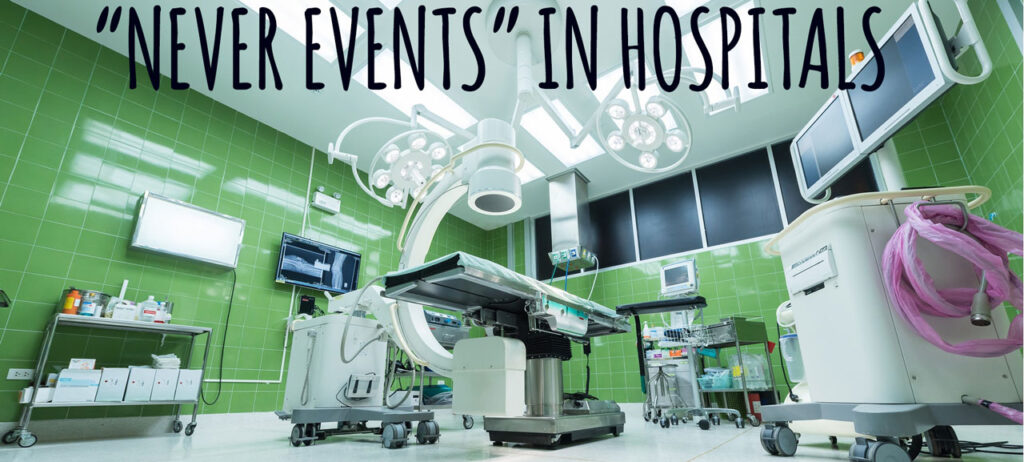When people go to the hospital, they expect quality care; however, there are serious, shocking mistakes that should never occur, and Medicare calls these mistakes “never events”. A few examples of never events include performing surgery on your leg when you require surgery for a broken arm, sending a baby home with the wrong family, injecting a patient with contaminated medication, or leaving a sponge or other foreign object inside of someone during an operation.
What is a “never event”?
Never events are:
- Foreign object retained after surgery – secondary diagnosis
- Air embolism – secondary diagnosis
- Blood incompatibility – secondary diagnosis
- Stage III and IV pressure ulcers – secondary diagnosis
- Falls and trauma – secondary diagnosis
- Catheter-associated urinary tract infection – secondary diagnosis
- Vascular catheter-associated infection – secondary diagnosis
- Surgical site infection-mediastinitis after coronary bypass graft
- Manifestations of poor glycemic control – secondary diagnosis
- Deep Vein Thrombosis / Pulmonary Embolism with total knee or hip replacement
- Surgical site infection – bariatric surgery
- Surgical site infection – certain orthopedic procedures of spine, shoulder and elbow
- Surgical site infection following cardiac implantable electronic device procedures
- Iatrogenic pneumothorax with venous catheterization
According to an article from the Patient Safety Network, 71% of these types of events reported to the Joint Commission over the past 12 years were fatal. The Joint Commission refers to itself as the “the nation’s oldest and largest standards-setting and accrediting body in health care”.
How should never events be handled?
Leapfrog, a non-profit watchdog organization, started questioning hospitals in 2007 about their protocol for dealing with these types of events. They even composed a list of standards, and a hospital fully meets these standards in handling a never event if they do the following: apologize to those affected, report it to a specific agency, perform an analysis to determine the underlying cause of the never event, waiving all costs related to the event and lastly, allowing a copy of their policy to be available to patients at their request.
Unfortunately, not every hospital follows these procedures when a never event occurs, and even worse, some may try to either downplay the never event, hide it, or deny it altogether. According to Leapfrog, almost one in five hospitals have not implemented vital policies dealing with never events.
What to do if you’ve been victimized by a never event
If you believe that you or a loved one have suffered from any type of never event or medical malpractice , please call my office as soon as possible for a free consultation. It is best to take action immediately with these types of situations, as the consequences can be extensive, swift, and ultimately, lethal.
SOURCES
http://www.qualityforum.org/Topics/SREs/List_of_SREs.aspx
https://psnet.ahrq.gov/primers/primer/3/never-events


